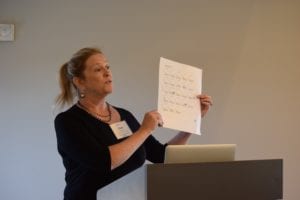Who is a member?
Our members are the local governments of Massachusetts and their elected and appointed leadership.

Chris Kluchman, the Housing Choice program director at the Department of Housing and Community Development, discusses the Housing Choices Act and other housing issues during the Sept. 21 meeting of the Massachusetts Selectmen’s Association in Lakeville. She illustrated how easily towns may check their housing production rates using the Massachusetts Housing Partnership’s DataTown chart. She said she compiled all of the Southeastern Regional Planning and Economic Development District towns on this sheet in just 10 minutes.
Housing was the primary topic of the Massachusetts Selectmen’s Association Regional Meeting on Sept. 21 in Lakeville, where attendees learned more about Gov. Charlie Baker’s Housing Choices Act (H. 3507).
Chris Kluchman, the Housing Choice program director at the Department of Housing and Community Development, thoroughly explained the bill, which she said is focused on housing production and maintaining local control over zoning.
H. 3507 would change state law (M.G.L. Ch. 40A) to reduce the vote threshold needed to adopt certain zoning changes in order to promote housing production. The threshold would be reduced from a two-thirds vote to a simple majority.
This change would apply to the following zoning amendments:
1. Reducing residential dimensional requirements (for example, to provide for smaller setbacks, smaller lot sizes, or higher buildings)
2. Reducing required residential parking ratios
3. Creating mixed-use zoning in town centers, and creating multifamily and “starter” home zoning in town centers, near transit and in other “smart growth” locations
4. Adopting “Natural Resource Protection Zoning” and “Open Space Residential Development” by right
5. Adopting provisions for transfer of development rights
6. Adopting 40R “smart growth” or “starter home” zoning overlay districts.
7. Allowing accessory dwelling units or “in-law” units by right
8. Allowing for increased density through a special permit process promoting more flexible development
9. In cases where communities already allow transit-oriented, multi-family and mixed-use projects by special permit, allowing projects with at least 10% affordable units
Kluchman emphasized that the Baker-Polito administration understands that not all cities and towns are the same, and that each community should be able to control its own destiny. The Housing Choices Act does not have any mandates, she said, and it would be up to each community to bring zoning amendments to increase housing production in ways that fit with the community’s vision.
Massachusetts is unique in its requirement of a supermajority vote for zoning amendments.
The MMA has long voiced its strong support for the bill, exemplified by the Board of Directors’ unanimous vote of support. MMA Executive Director Geoff Beckwith has called the bill “the most significant zoning reform measure in five decades.”
In testimony before the Joint Committee on Housing on May 14, the MMA argued that the bill would give municipalities the ability to increase higher-density housing production, while ensuring that new developments align with community and neighborhood needs. The MMA argued that the bill respects the local processes for zoning amendments and only changes the ultimate voting threshold necessary for those zoning amendments to pass, from two-thirds to a majority.
Last year, the MMA joined an unprecedented coalition with the Greater Boston Real Estate Board, the Home Builders and Remodelers Association of Massachusetts, the Massachusetts Association of Realtors, and NAIOP – The Commercial Real Estate Development Association to advocate for passage of the bill. The coalition is urging passage of the bill this year to help kick-start a wave of community-based proposals in time for spring town meetings.
Also at the meeting, Easton Select Board Chair Dottie Fulginiti, director of local leadership for the Massachusetts Smart Growth Alliance, encouraged local leaders to initiate conversations about housing. Housing production and economic development go hand in hand, she said.
When municipal officials lead the conversation at citizen hearings and town meetings, do their homework, set the ground rules for conversation, and use resources available to them, such as a master plan or housing production plan, to show how new growth would benefit the community, Fulginiti said, municipal officials are more likely to see positive outcomes.
By being proactive, the Easton Select Board was able to negotiate with a housing developer to install a larger wastewater treatment facility that would ultimately support the growth of more businesses in the town center, where the town lacks sewer infrastructure.